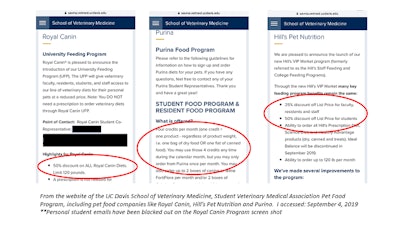
Canine dilated cardiomyopathy (DCM) has been a hot topic for the past year, to the point that pet food companies are now touting the benefits of ancient grains and whole grains. This article takes a deeper dive into the Food and Drug Administration (FDA) investigation update on DCM released in June 2019, pet foods known as BEG (boutique, exotic ingredients and grain-free diets) and how veterinary bias may be impacting the messaging to consumers.
FDA investigation into DCM produced more than pretty graphs!
In addition to the pretty bar graphs provided in the latest FDA investigation update, there was additional information that did not make the press or the top headlines in veterinary journals. For example, the update recognized that past publications and research suggest that Golden Retrievers may be genetically predisposed to taurine deficiency, which is well-documented as potentially leading to DCM.
Keep in mind all the information provided up to this point never looked at genetics.
No deficiencies or differences in grain-free pet foods
In an accompanying, June 2019 update on their collaborative investigation with Vet-LIRN, FDA also acknowledged that they are still gathering information to better understand if (and how) taurine metabolism (both absorption and excretion) may have a role in these reports of canine DCM. Also, the agency had tested multiple products for minerals and metals (calcium, magnesium, phosphorus, iron, cobalt, copper, zinc, selenium, iodine) and amino acids including taurine, cysteine and methionine. That product testing did not reveal any abnormalities.
FDA even found that average percentages of protein, fat, total taurine, total cystine, total methionine, total methionine-cystine and resistant starch content on a dry-matter basis were similar for both grain-free labeled and grain-containing products involved in the investigation. Thus, the agency has not found any nutrient deficiencies to date.
That being said, FDA has not looked at digestibility and/or bioavailability of these nutrients in dogs, nor do we know taurine synthesis efficiencies in all breeds.
Dogs also had other diseases besides DCM
In the Vet-LIRN update, FDA reviewed 340 dogs’ medical records. Only 202 dogs (59.4%) were confirmed DCM cases with heart changes characteristic of DCM on cardiac ultrasound – including decreased ventricular systolic function and dilation.
Of the pets with confirmed DCM, approximately 15% (n=32) also had evidence of valvular degeneration and 12% (n=24) had atrial fibrillation. Approximately 38% (n=77) of the dogs had a history of confirmed or suspected allergies or sensitivities to an environmental and/or food allergen that were manifested as dermatitis, otitis or gastrointestinal disease. Approximately 9% (n=18) and 8% (n=17) of dogs with DCM had a history of hypothyroidism and one or more tick-borne diseases (e.g. Lyme, Anaplasmosis), respectively.
Why are these numbers important? First, without considering them, veterinarians may be too quick to come to a solution: DCM = a deficiency, such as in taurine, or a dietary cause. Second, there could be other underlying factors like primary or secondary illnesses. For example, in humans, when gastrointestinal disease exists, there is an increased risk of DCM, which is linked to carnitine deficiency. Thus, it becomes important to know the case history in addition to diet history. In the day and age of Dr. Google, clients could be self-diagnosing gastrointestinal issues by switching their pets to grain-free foods, and veterinarians may not know there is another underlying issue.
Also, the taurine values of affected dogs have been all over the board (low, medium and high) regardless of DCM disease status (based on FDA data). Thus, taurine is not necessarily the root cause. Last, FDA has not found a link or correlation of BEG food causing DCM – contrary to how the popular press may spin the graphs.
Why do genetics need to be considered?
The FDA update and Lisa M. Freeman, DVM, Ph.D., D.A.C.V.N., a veterinarian and professor with the Cummings Veterinary Medical Center at Tufts University, both referenced a Stern study; it was actually published by Kaplan et al. on December 13, 2018. Unfortunately, neither Freeman’s blog post nor the 2019 FDA update makes mention of the study results.
The researchers identified 40 Golden Retrievers to participate in the study; 16 were excluded because of inadequate imaging, had no evidence of DCM/cardiac disease or had normal taurine status. Being a scientist, I still would have captured the data and presented it because they could have served as controls. But that is just me.
Of the remaining 24 Golden Retrievers identified for the study, 23/24 dogs diagnosed with taurine deficiency and DCM were fed diets that were either grain-free, legume-rich or a combination of these factors. I wonder what the non-taurine deficient and non-DCM dogs were fed?
Although they were quick to conclude that these dogs were being fed grain-free, legume-rich foods (as designed by inclusion criteria), it is important to point out that the author(s) noted the limitations (i.e., lack of control group) in their study.
Kaplan et al. concludes, “The need for controlled, prospective studies of larger sample size are needed to determine if the clear associations identified in this manuscript represent a cause-and-effect relationship between DCM, taurine-deficiency, specific ingredients and grain-free food varieties in general. Without such studies we cannot conclusively define which dietary characteristics are involved with the pathogenesis of this condition.”
Based on the data they observed, one could only draw the conclusion that DCM could be associated with grain-free dry kibble since only 9 out of 26 reported number of dogs (34.6%) consuming the foods were consuming “exotic” proteins.
Guess what? No genetic testing was performed in this study. The researchers also concluded taurine deficiency and dilated cardiomyopathy in Golden Retrievers is likely multifactorial, including a combination of dietary, metabolic and genetic factors. The FDA update is aligned with the genetic statement for Golden Retrievers.
Is veterinary bias at play?
It makes you wonder why Freeman and co-author Dr. Joshua Stern didn’t bring up this study in the non-peer-reviewed, opinion-based article, "Diet associated dilated cardiomyopathy in dogs: what do we know?" published in December 2018 in the Journal of the American Veterinary Medical Association (JAVMA). Could it be veterinary bias or conflict of interest? Bear with me for a second.
As a board-certified nutritionist, I will be the first to tell you that grain-free pet foods are no better than grain-inclusive ones. In fact, in 2017, I wrote a blog post titled, “Why grain-free pet food isn’t better and carbs are good,” which focused on the benefits of carbohydrates in foods (both nutritionally and from a food science standpoint) and how both were highly digestible. Most will acknowledge the only benefit of grain-free foods exists for animals with food sensitivities; however, given the large pet food recall in 2007, consumers see grain-free as a more premium product today.
What does this mean for veterinarians? If they recognize there is no difference in the foods that contain grains or are grain-free, then they need to take into account any perceived bias or conflicts of interest before they engage with their clients (or the information they read). Veterinarians need to recognize that consumers may be feeding their dogs certain foods because of their own lifestyle choices without detriment to the pet (i.e., organic, grain-free, gluten free, no beef, etc.).
Thus far, we have covered how there is no direct link of BEG foods to DCM. Additionally, we recognize the rise and preference of grain-free pet foods by consumers; however, there may be many veterinarians that are still fearful of or downright despise grain-free foods. Well, it must make you wonder why?
Is it because of the article they read in JAVMA, which they took as fact-based paper vs. an opinion commentary? Is it based on what they were taught in school, the foods they carry in their clinics or the clinical studies they have read throughout their careers? If the answer is yes to any those questions, veterinarians may have an unknown bias that could inadvertently being impacting their decision-making. How so?
How an unknown bias may affect veterinarians’ decisions
First, let’s focus on articles and clinical studies. They may appear to be fact based and may have reputable people authoring the study or article. But, even in those cases, do the authors’ schools receive any funding that could persuade them to think in a certain way when designing the studies or writing the article?
For example, the authors of the JAVMA article all work for universities that have nutrition services and nutritionists who have received research funding from Purina, Hill’s Pet Nutrition and/or Royal Canin. If you read the fine print or understood all the other funding going into the university besides research, would you think differently?
Second, let’s consider how corporate sponsors impact a veterinarian throughout their education. The companies I mentioned above have also funded nutrition centers and feeding programs for these schools’ veterinary students; plus, schools can receive 50% off Royal Canin, 50% off Hill’s and free products from Purina, for example.* Could this lead to a potential bias later on in a veterinarian’s career? If a Blue Buffalo, Champion or another top-selling grain-free pet food company sponsored and continuously funded the universities, would the JAVMA article be different?
It certainly makes you think. I guess only time will tell. With Blue Buffalo sponsoring the Clinical Trials Office at Ohio State University College of Veterinary Medicine, we will see if it has a positive impact for the company.

*Note: This blog post has been revised to add information about discounts available to veterinary programs and to remove the website screen shot originally included.
















